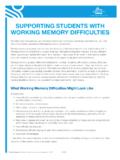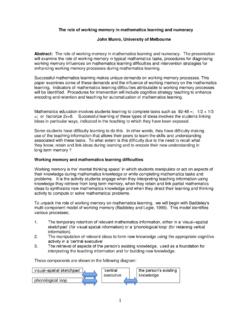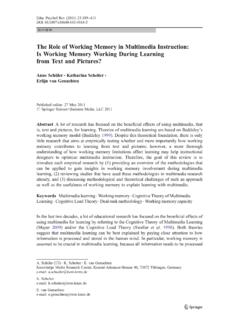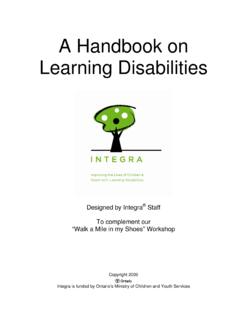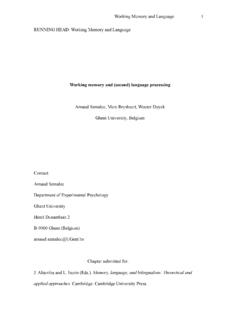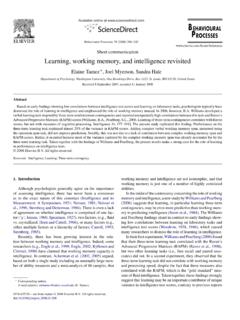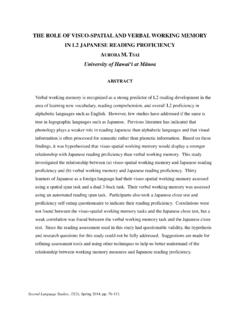Transcription of Working Memory, Language and Reading by Maxine L. Young
1 Working memory , Language and Reading May 2000 by Maxine L. Young Eight-year-old Jennifer listened carefully as the teacher said, "After you are done with your math worksheet, get out your Reading book and finish answering the questions on page fifteen, at the bottom of the page." Other children quickly went to work but Jennifer timidly raised her hand and asked the teacher to repeat the directions. Even though she is a bright child, routine oral directions such as this are hard for Jennifer to follow. Was Jennifer having trouble paying attention or did she simply forget what was said? The fact is that Jennifer is a bright child who has problems with Working memory . This makes routine tasks, such as following lengthy oral directions, complicated and frustrating. What is Working memory ?
2 Is Working memory different from short- or long-term memory ? How does it affect Language and Reading ability in children? In the 1980s, two English researchers named Baddeley and Hitch coined the term " Working memory " for the ability to hold several facts or thoughts in memory temporarily while solving a problem or performing a task. Baddeley's research also showed that there is a "central executive" or neural system in the frontal portion of the brain responsible for processing information in the " Working memory ." He coined the term "articulatory loop" for the process of rapid verbal repetition of the to-be-remembered information, which greatly helps maintain it in Working memory . For an example of Working memory , consider the following. Imagine you are lost while driving to a meeting.
3 You stop at a service station and the attendant says, "Make a right at the first red light. Go three blocks until you see a stop sign and make a left turn onto Willow Street. Then look for a large green sign about two and a half blocks down Willow, and enter the parking lot." Even as you read this, some of you are imagining repeating the directions over and over, under your breath, as you drive to your destination, using your own "articulatory loop". The type of memory needed to hold such information in one's mind while Working on it is called Working memory . Short-term memory holds information in mind for only a few seconds as it is processed. Long-term memory is where such processed information is permanently stored. Working memory is an intermediary and active memory system in the information processing area of the brain.
4 It is an important memory system and one that most of us use every day. Language , learning , and Working memory Working memory weaknesses, however, plague many school-aged children and adults. Working memory is required to understand spoken Language ; to comprehend what is read; to write sentences, paragraphs, and stories; to do problem-solving tasks, and perform some math operations. Research on children with Language delays, that is children who develop Language much later than the norm but who have normal nonverbal intelligence, shows that they have Working memory problems. They are referred to as having specific Language impairment (SLI) and are at risk for having Reading disabilities. Research has also shown that children between the ages of 4 and 6 with SLI and limited Working memory capacity, have delays in vocabulary development.
5 The syntactic development of children is affected by Working memory . Syntax refers to the order of words in sentences that contributes to meaning. The difference between the following sentences, "The dog bit the boy", and "The boy bit the dog" is due to the order of the words, or the syntax, in each. Research with school-aged children who have Reading problems shows that they also have syntactic comprehension problems linked to Working memory capacity. In the classroom, students with limited Working memory capacity may become lost listening to lectures that introduce new concepts and vocabulary. In the adolescent and college student population, many studies have traced problems with note taking and Reading comprehension to limitations in Working memory . Studies on adults with Reading disability also identified them as having Working memory deficits.
6 Working memory plays an important role in math also. When a child does a page of simple single-digit math, with alternating rows of addition and subtraction problems, it is Working memory that helps the child remember to add or subtract the entire row. Children use a form of Working memory , called serial memory , to count the number of cookies on a plate when figuring out how many are left for lunch the next day. Remembering not to count any cookie more than once is also a function of serial memory . Adults use Working memory when keeping the total price of groceries in a cart in mind, as each new item is added, so as not to exceed a predetermined amount. Sentence comprehension relies heavily on adequate Working memory . For example, Working memory is required to comprehend sentences that are complex in structure such as, "The clown that is hugging the boy is kissing the girl.
7 " It helps us interpret sentences that are lengthy, "Do every other problem on page fifteen and all of the problems on page sixteen before checking your answers in the back of the book." We use Working memory when preservation of word order (syntax) is important to correctly understand a sentence like; "It was the boy's ball and not the girl's, that was dirty." Working memory permits the listener to hold verbal information in mind long enough to make sense of the sequence of words, process them for long-term storage, and to perform verbal problem-solving tasks. Automaticity With repeated and extensive practice at processing information some tasks require less effort and become more automatic. Examples are learning the alphabet letter names, the addition facts or multiplication tables, and sight word vocabularies.
8 When such skills become automatic, the brain is relieved of having to process individual units of information. This permits the brain to perform more complex processing and problem solving tasks. It also improves the efficiency of the Working memory system. Some research has suggested that increased processing and Working memory ability in an adult's brain is a result of greater automaticity. For children with auditory processing problems, Working memory abilities often suffer. Understanding spoken Language for these children is not fully automatic. They must spend so much energy processing each word sound-by-sound that Language comprehension suffers. Reading comprehension is highly dependent on Working memory ability. Children who have Reading comprehension problems are of concern to parents and educators.
9 Some children have comprehension problems because they struggle when sounding out words, syllable-by-syllable, from one page to the next. Others may not have developed an adequate sight word vocabulary. Children with weak vocabulary development are also at risk for having Reading comprehension problems. Yet there are many children and adults who can sound out words accurately, have well developed vocabularies, and can read sentences fluently, but who do not remember or comprehend what they read. For them it is a limitation in Working memory capacity that prohibits print from becoming meaningful. Working memory and Reading How do Working memory problems interfere with Reading comprehension? Reading is a complex skill that requires the simultaneous activation of many different brain processes.
10 When Reading a word, the reader must recognize the visual configuration of letters, the letter order, and must engage in segmentation (breaking the word into individual sounds). Then, while being held in Working memory , the phonemes (letter sounds) must be synthesized and blended, to form recognizable words. To comprehend sentences, several more skills are necessary. The reader must not only decode the words, but also comprehend the syntax, retain the sequence of words, use contextual cues, and have adequate vocabulary knowledge. This must be done simultaneously in order for sentences to be understood. At the same time, sentences must be held in Working memory and integrated with one another. Each sentence is read, understood, associated and integrated with the previous one and so on.
